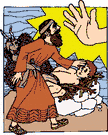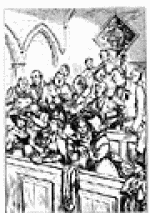|
BACKGROUND
The background to this teaching is found in the book 'Eagles Fly High!'.
DOWNLOADABLE HERE
|
Online links to scriptures (New International Version [NIV] unless otherwise stated) are shown in blue
| WHY WALK IN THE WAY? |
|
 Faith resulting in works. Pretty amazing faith in this instance! Fortunately God stepped in and stopped the works in time! Incidentally, it has been calculated that Isaac was 25-27 years old at the time, so his faith and obedience levels (passive work in this instance – allowing himself to be bound and laid on the alter, waiting for a knife to slit his throat) were extremely high too! Yes, we need to walk in the way, for our journey is meant to be one of ever increasing levels of both faith and works. The whole point of this book is that there are so many amazing treasures that God has in store for us when we seek a deeper and still deeper and deeper still relationship with Him. When we walk in the way. Faith resulting in works. Pretty amazing faith in this instance! Fortunately God stepped in and stopped the works in time! Incidentally, it has been calculated that Isaac was 25-27 years old at the time, so his faith and obedience levels (passive work in this instance – allowing himself to be bound and laid on the alter, waiting for a knife to slit his throat) were extremely high too! Yes, we need to walk in the way, for our journey is meant to be one of ever increasing levels of both faith and works. The whole point of this book is that there are so many amazing treasures that God has in store for us when we seek a deeper and still deeper and deeper still relationship with Him. When we walk in the way.
|
|
|
 Let’s look at our natural life, for example. Before conception we don’t exist! Now there are a lot of people who go to church who don’t exist, in the sense of not being in God’s family. They are called “Religious†people, who believe that attendance at church, plus, maybe, doing of a few good deeds, is enough to buy them a ticket on the fast ferry to heaven. Or in these days, they leave out the going to church bit also, relying on their good deeds alone to pay their fare. Usually they believe that there are many ways of finding God. A “New Age Reincarnation†of age-old ideas. They will undoubtably be highly critical of this teaching as being narrow and fanatical. Let’s look at our natural life, for example. Before conception we don’t exist! Now there are a lot of people who go to church who don’t exist, in the sense of not being in God’s family. They are called “Religious†people, who believe that attendance at church, plus, maybe, doing of a few good deeds, is enough to buy them a ticket on the fast ferry to heaven. Or in these days, they leave out the going to church bit also, relying on their good deeds alone to pay their fare. Usually they believe that there are many ways of finding God. A “New Age Reincarnation†of age-old ideas. They will undoubtably be highly critical of this teaching as being narrow and fanatical.
Reminds me of a great definition of a “fanatic†– someone who loves God more than you do! That is the last time we will talk of these people, as this teaching definitely is not for them, whether they religiously go to church or not.
|
|
|
 When born we are, of course, ‘children’. In a loving home, children are cared for as they are unable to fend for themselves. They are fed, clothed, housed, loved and given gifts. This relates to the ‘born again’ experience. For we become a “child of Jesusâ€. He loves us, feeds us and gives us gifts. When born we are, of course, ‘children’. In a loving home, children are cared for as they are unable to fend for themselves. They are fed, clothed, housed, loved and given gifts. This relates to the ‘born again’ experience. For we become a “child of Jesusâ€. He loves us, feeds us and gives us gifts.
|
|
|
 Then we grow into ‘teenagers’! We start pushing out into life, seeking to find our own niche. It can be very painful. Most people you ask would not like to go through those years again. Big highs, but often, even bigger lows. Can you relate to that? Spiritually, this relates to the charismatic/pentecostal experience. The blessings of the Holy Spirit’s gifts, counterbalanced by the attacks of Satan. A time of finding out whom we are in God. Then we grow into ‘teenagers’! We start pushing out into life, seeking to find our own niche. It can be very painful. Most people you ask would not like to go through those years again. Big highs, but often, even bigger lows. Can you relate to that? Spiritually, this relates to the charismatic/pentecostal experience. The blessings of the Holy Spirit’s gifts, counterbalanced by the attacks of Satan. A time of finding out whom we are in God.
|
|
|
 The trials of the teens lead into the maturity of ‘adulthood’. Not throwing away our youthful enthusiasm, but learning instead, to harness the highs and control the lows of our teenage years. This can be compared to coming into maturity in Christ, through the inspiration and guidance of the Holy Spirit. Learning to be as Jesus was, in total submission to the will of God the Father. The trials of the teens lead into the maturity of ‘adulthood’. Not throwing away our youthful enthusiasm, but learning instead, to harness the highs and control the lows of our teenage years. This can be compared to coming into maturity in Christ, through the inspiration and guidance of the Holy Spirit. Learning to be as Jesus was, in total submission to the will of God the Father.
(The power of 3!)
|
| <i>NEXT WEEK</i> WALKING IN THE WAY: OUR JOURNEY THROUGH LIFE concludes |
|
 with a look at time, and how it applies both to the church and our own lives. with a look at time, and how it applies both to the church and our own lives.
|
| A NOTE FROM DAVID |
|
 Growing up in God is much more difficult than in the natural, as we have to make a conscious effort to do it, to build our relationship with the Father, through Jesus and the Holy Spirit. Growing up in God is much more difficult than in the natural, as we have to make a conscious effort to do it, to build our relationship with the Father, through Jesus and the Holy Spirit.
Many Christians remain as spiritual 'children' all through their natural lives.
Ancient Babylonia - Religion, Law Science and the Arts
Religion, law, science and the arts altered very little. The three main gods, An, Enlil and Enki (Ea in Akkadian) headed the pantheon of gods, but when Babylon rose as a dynasty the chief God of that city was Marduk. Marduk rose in status almost to that of Enki, who was said to be his father.
Legal practice was basically the same, with a few new laws such as "an eye for eye, a tooth for a tooth" (lex talionis), which came from the Amorites. Legal formulas were phrase in the Sumerian language although legal contracts and the "law codes" now written in Akkadian.
The literature of the Sumerians was studied extensively during the Isin-Larsa period and soon an Akkadian literature began to appear in the north. Although the Sumerian language had died as a spoken language, it continued to be used for a Babylonian civilization for liturgical and scholarly purposes.
Some distinctive features that occurred in the Babylonian civilization are worth mentioning. There was a serious power shift to the north because in the south the salt table of the subsoil had risen because of over-irrigation and poor drainage, to such a point that the crop yields began to diminish and could no longer support the population. Another distinctive feature was the rise of the Babylonian dialect of Akkadian, which later replaced the Sumerian language and Old Akkadian dialect of the third millennium, both in spoken in written communication.
|
So until next week.......
MAY GOD BLESS YOU AND YOU BLESS GOD!
His servant and yours

Learn more about us at...
www.wwj.org.nz/about.php
|
A DAVID'S DOODLING
879. A disciple turns words into actions.
David Tait
|
Check
out the WWJ website for….
More David's Doodlings: www.wwj.org.nz/dd.php
Life's a Laugh: http://www.wwj.org.nz/lifelaugh.php
Links to other sites of interest: http://www.wwj.org.nz/links.php
Till Death do us Part!: http://www.wwj.org.nz/tddup.php
Pets Rule!: http://www.wwj.org.nz/pets.php
|

 Faith resulting in works. Pretty amazing faith in this instance! Fortunately God stepped in and stopped the works in time! Incidentally, it has been calculated that Isaac was 25-27 years old at the time, so his faith and obedience levels (passive work in this instance – allowing himself to be bound and laid on the alter, waiting for a knife to slit his throat) were extremely high too! Yes, we need to walk in the way, for our journey is meant to be one of ever increasing levels of both faith and works. The whole point of this book is that there are so many amazing treasures that God has in store for us when we seek a deeper and still deeper and deeper still relationship with Him. When we walk in the way.
Faith resulting in works. Pretty amazing faith in this instance! Fortunately God stepped in and stopped the works in time! Incidentally, it has been calculated that Isaac was 25-27 years old at the time, so his faith and obedience levels (passive work in this instance – allowing himself to be bound and laid on the alter, waiting for a knife to slit his throat) were extremely high too! Yes, we need to walk in the way, for our journey is meant to be one of ever increasing levels of both faith and works. The whole point of this book is that there are so many amazing treasures that God has in store for us when we seek a deeper and still deeper and deeper still relationship with Him. When we walk in the way.  Let’s look at our natural life, for example. Before conception we don’t exist! Now there are a lot of people who go to church who don’t exist, in the sense of not being in God’s family. They are called “Religious†people, who believe that attendance at church, plus, maybe, doing of a few good deeds, is enough to buy them a ticket on the fast ferry to heaven. Or in these days, they leave out the going to church bit also, relying on their good deeds alone to pay their fare. Usually they believe that there are many ways of finding God. A “New Age Reincarnation†of age-old ideas. They will undoubtably be highly critical of this teaching as being narrow and fanatical.
Let’s look at our natural life, for example. Before conception we don’t exist! Now there are a lot of people who go to church who don’t exist, in the sense of not being in God’s family. They are called “Religious†people, who believe that attendance at church, plus, maybe, doing of a few good deeds, is enough to buy them a ticket on the fast ferry to heaven. Or in these days, they leave out the going to church bit also, relying on their good deeds alone to pay their fare. Usually they believe that there are many ways of finding God. A “New Age Reincarnation†of age-old ideas. They will undoubtably be highly critical of this teaching as being narrow and fanatical. When born we are, of course, ‘children’. In a loving home, children are cared for as they are unable to fend for themselves. They are fed, clothed, housed, loved and given gifts. This relates to the ‘born again’ experience. For we become a “child of Jesusâ€. He loves us, feeds us and gives us gifts.
When born we are, of course, ‘children’. In a loving home, children are cared for as they are unable to fend for themselves. They are fed, clothed, housed, loved and given gifts. This relates to the ‘born again’ experience. For we become a “child of Jesusâ€. He loves us, feeds us and gives us gifts. Then we grow into ‘teenagers’! We start pushing out into life, seeking to find our own niche. It can be very painful. Most people you ask would not like to go through those years again. Big highs, but often, even bigger lows. Can you relate to that? Spiritually, this relates to the charismatic/pentecostal experience. The blessings of the Holy Spirit’s gifts, counterbalanced by the attacks of Satan. A time of finding out whom we are in God.
Then we grow into ‘teenagers’! We start pushing out into life, seeking to find our own niche. It can be very painful. Most people you ask would not like to go through those years again. Big highs, but often, even bigger lows. Can you relate to that? Spiritually, this relates to the charismatic/pentecostal experience. The blessings of the Holy Spirit’s gifts, counterbalanced by the attacks of Satan. A time of finding out whom we are in God.  The trials of the teens lead into the maturity of ‘adulthood’. Not throwing away our youthful enthusiasm, but learning instead, to harness the highs and control the lows of our teenage years. This can be compared to coming into maturity in Christ, through the inspiration and guidance of the Holy Spirit. Learning to be as Jesus was, in total submission to the will of God the Father.
The trials of the teens lead into the maturity of ‘adulthood’. Not throwing away our youthful enthusiasm, but learning instead, to harness the highs and control the lows of our teenage years. This can be compared to coming into maturity in Christ, through the inspiration and guidance of the Holy Spirit. Learning to be as Jesus was, in total submission to the will of God the Father. with a look at time, and how it applies both to the church and our own lives.
with a look at time, and how it applies both to the church and our own lives.  Growing up in God is much more difficult than in the natural, as we have to make a conscious effort to do it, to build our relationship with the Father, through Jesus and the Holy Spirit.
Growing up in God is much more difficult than in the natural, as we have to make a conscious effort to do it, to build our relationship with the Father, through Jesus and the Holy Spirit.